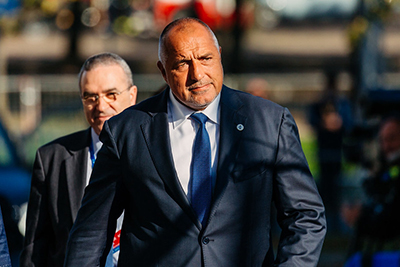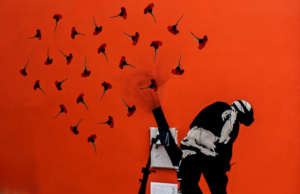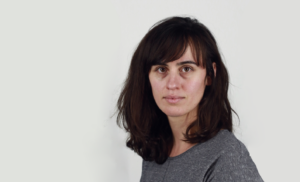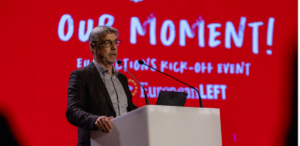Georgi Pirinski analyses the parliamentary elections that took place in Bulgaria at the beginning of October, looking at how the result affects central issues such as overcoming corruption and Bulgaria’s position on the war in Ukraine, and what consequences the Bulgarian left can draw from the election.
Results and changes
On 2 October, Bulgarians voted in parliamentary elections for the fourth time in 18 months. The snap election was called after the fall of the Kiril Petkov government, a four-party coalition (PP, BSP, ITN and Democratic Bulgaria). This was the third snap parliamentary election since 2021, an unprecedented situation in Bulgarian history, the previous ones being the April, July and November 2021 elections.
The turnout in the last election fell to an all-time low of 39.4%, with the following seven parties entering Parliament (percentages of votes cast and seats won):
|
GERB |
(“Citizens for European Development of Bulgaria”/SDS) |
23.36 % |
67 |
|
PP |
(“We continue the change”) |
20.20 % |
53 |
|
DPS |
(“Movement for rights and freedoms”) |
13.71 % |
36 |
|
“Vazrazhdane” |
(“Revival”) |
27.00 % |
27 |
|
BSP |
(The Bulgarian socialist party) |
9.31 % |
25 |
|
DB |
(“Democratic Bulgaria” coalition) |
7.45 % |
20 |
|
BV |
(“Bulgarian rise”) |
4.63 % |
12 |
|
In Total: |
88.85 % |
240 |
|
*The remaining 11.15% of the votes went to the other 23 participants, who fell short of the 4% barrier (including ITN, the “There is such a people” party of showman Slavi Trifonov that had been prominent in the two previous short-lived legislatures), plus a full 3.3% choosing to vote “I support no one”.
GERB, headed by former Prime Minister Boyko Borisov, came out on top, outlasting the charges of widespread corruption while in power for the twelve years leading up to 2020 (which provoked mass protests in the summer of that year). However, it gained only 67 seats – far short of the 121 needed for a governing majority. PP, the movement-turned-party that emerged from the protests against GERB, slipped to second place. The majority of voters this time favoured apparent stability over uprooting corruption and showed their disappointment with the record of the outgoing PP-headed cabinet. After winning the previous elections on 14 November 2021, PP – led by two Harvard graduates, Kiril Petkov as Prime Minister and Asen Vasilev as Deputy Prime Minister and Minister of Finance – formed a cabinet with three other quite diverse partners. Alongside the populist ITN, the centre-right DB, and the left BSP, they had high hopes for clean government and expectations for dynamic growth. However, it fell apart after only six months, leading to the early election on 2 October.Two other parties to have won seats, “Vazrazhdane” and BV, represent another set of changes. The first of these, a hard nationalist party that is against NATO and EU membership, increased its support twofold. It has rejected any coalition with other parties in the new Parliament. The second, BV, is a new party entering Parliament for the first time. It also prioritises “the Bulgarian national interest”, while stating that it is ready to talk to all parties.
Issues and strategies
A central issue both before and after the elections is about overcoming corruption and ensuring a functioning judiciary, able to prosecute and sentence perpetrators in high office. Much of the pre-election debates had to do with judicial reform, with the various participants exchanging charges about the lack of long-overdue action.
Despite winning the elections, GERB are still considered as “toxic” because of their past record of abusing their power, and PP is therefore outright refusing any collaboration with them. They have been joined in this position by their former partners, DB and the BSP. The third party in Parliament, the mainly ethnic-Turkish DPS, is also considered to have been in an informal partnership with GERB and therefore is unwelcome as a possible partner in a new governing coalition.
Another hugely divisive issue was the question of lifting Bulgaria’s veto on negotiations regarding the accession of the Republic of North Macedonia to the EU. The veto was motivated by North Macedonia’s refusal to recognise the existence of an ethnic Bulgarian part of the population and to protect their human rights, plus the realities of widespread hate speech against Bulgaria. PP was seen by many to have been overly eager to accept the so-called compromise of the French Presidency formula, considered by parts of society as a virtual sell-out of core national identity priorities.
One more hotly contested issue was Bulgaria’s position regarding the war in Ukraine. Bulgaria accepted tens of thousands of Ukrainian refugees and stated its support for Ukraine in the conflict yet refrained from sending arms. Bulgarian society was strongly divided over whether to do so. PP were seen to be too hasty to refuse the Ruble conversion for Gazprom gas delivery payments, making Bulgaria one of the first two countries to have its supplies cut off. The eviction of 70 Russian diplomats and staff was also viewed by many in a similar light.
Besides, the role of President Radev (re-elected in November 2021 to a second five-year term in office) was and remains another controversial issue. Over the course of 2021–2022, the President, acting in compliance with the Constitution, had to appoint three successive caretaker cabinets, each with a two-month mandate, extending into a third month of governing before a newly returned Parliament could elect a government. This was necessary twice in 2021 because of the two short-lived Parliaments failing to assemble governing coalitions and happened for a third time this year after the disintegration of the four-party coalition in the last Assembly at the end of July.
PP, along with DB and the BSP (somewhat surprisingly in the case of BSP, since Radev initially had been its nominee for the presidency back in 2016) have claimed that through these caretaker cabinets, President Radev has been exerting improper influence over the political process by being openly critical of the government’s record and by indirectly favouring key executive appointments and decisions.
Meanwhile, throughout the pre-election campaign people were left with the feeling that the parties were enmeshed in politicking and far away from the burning issues facing citizens about making ends meet in light of skyrocketing heating, electricity and food prices. The upshot has been a fundamental decoupling of politics from citizens’ preoccupations, resulting in an almost complete collapse of trust in elections, institutions, and the overall democratic political process. One illustration was the proposal put forward by ITN in the course of the election campaign to hold a referendum on the question of whether Bulgaria should become a presidential republic rather than remain a parliamentary one.
This whole array of issues and challenges will be coming to a head on 19 October – the date set by presidential decree for the first session of the newly elected Parliament, once again opening Radev to charges by his critics that he has unduly prolonged the time after 2 October to do so. As of the present moment, with the chances of forming a government looking quite dim, the prospect of another early election sometime in the beginning of 2023 seems increasingly probable.
The left
The principal representative of the left – the Bulgarian socialist party – suffered a further humiliating reversal, dropping to fifth place with under 10% of the vote, despite the leadership’s efforts to present the party’s record in government as strongly socially and peace-oriented. The party has thus been reduced from being one of the two main political parties in the country to its present all-time low. It is considered to have been part of the status quo while GERB was in power, after a re-orientation to a line of “traditional family and national values” in an unsuccessful attempt to compete with outright nationalist formations and, last but not least, an intra-party campaign to get rid of “the enemies within”.
A number of left-of-centre formations took part in the elections with little success, reflecting the fragmentation and disarray among the left-leaning spectrum of society. With the BSP failing in its role of a strong left pole, the question of adequate representation of left-leaning citizens has acquired a new urgency, in light of growing nationalist and antidemocratic stirrings.
Cover photo: GERB leader and former Prime Minister Boyko Borisov – Source: Arno Mikkor via flickr.com



